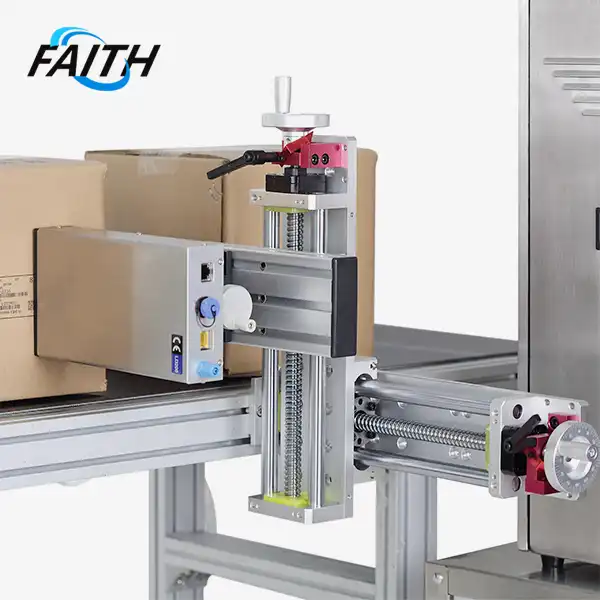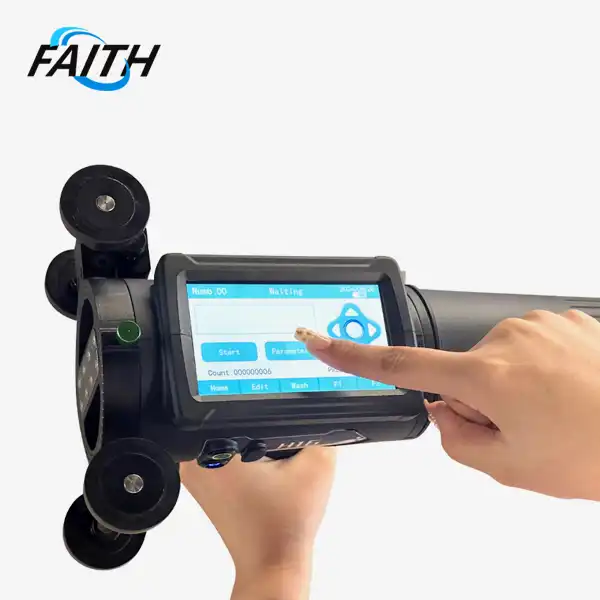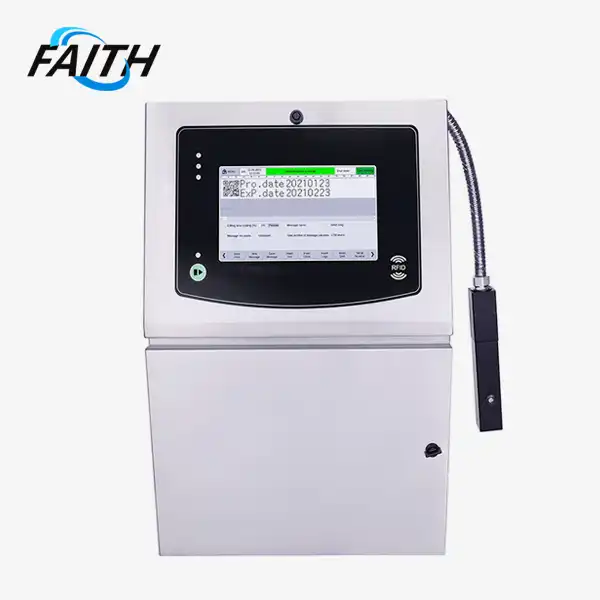Discover Handheld Inkjet Printer for Bottles and How to Use It Efficiently
Handheld inkjet printer for bottles have revolutionized the beverage industry, offering a portable and efficient solution for on-the-go labeling. These compact devices provide high-quality printing on various bottle materials, ensuring clear and durable product information. With user-friendly interfaces and advanced features, handheld inkjet printers streamline production processes, enhance traceability, and allow for customizable designs. This article delves into the world of handheld inkjet printers for bottles, exploring their benefits, applications, and best practices for optimal use in diverse manufacturing environments.
Understanding Handheld Inkjet Printers for Bottles: Features and Benefits
Key Features of Modern Handheld Inkjet Printers
Handheld inkjet printers for bottles have come a long way in recent years, boasting an array of impressive features. Faith's cutting-edge KD360-M model exemplifies the advancements in this technology. Weighing a mere 0.3kg, it redefines the concept of lightweight efficiency in the printing industry. The 3.5-inch color screen with capacitive touch functionality ensures ease of use, while the 600DPI high-definition inkjet printing capability allows for crystal-clear presentation of production dates and brand logos.
Multi-language support is another crucial feature, breaking down geographical barriers and making these printers suitable for global operations. The quick-drying ink technology employed in these devices is compatible with various materials, including paper, plastic, and metal, expanding their versatility across different bottle types and packaging materials.
Benefits of Using Handheld Inkjet Printers in Bottle Production
The adoption of handheld inkjet printers in bottle production lines brings numerous advantages. Their portability allows for flexible use across different production stages, from initial labeling to quality control checkpoints. The high-resolution printing ensures that essential information, such as expiration dates, batch codes, and nutritional facts, remains legible and compliant with industry regulations.
Faith printers offer unparalleled print quality, delivering clear, high-resolution prints even on curved and wet surfaces. This capability is particularly valuable in beverage manufacturing environments where bottles may have condensation or unique shapes. The versatile substrate compatibility enables effortless printing on PET, glass, and various label materials, accommodating diverse product lines.
Moreover, these printers use food-safe inks that meet stringent FDA, EU 1935/2004, and NSF standards, ensuring product safety and regulatory compliance. The durability of Faith's printers, engineered to withstand humid and cold environments typical in beverage factories, guarantees reliable performance under challenging conditions.
Efficient Use of Handheld Inkjet Printers: Best Practices and Tips
Optimizing Printer Settings for Maximum Efficiency
To maximize the efficiency of handheld inkjet printers for bottles, it's crucial to optimize the printer settings. Start by selecting the appropriate print resolution based on the specific requirements of your labels. While higher resolutions offer better quality, they may consume more ink and slow down printing speed. For most applications, a resolution of 300-600 DPI strikes a good balance between quality and efficiency.
Adjust the ink density settings to ensure optimal ink coverage without oversaturation. This not only improves print quality but also helps conserve ink. Faith's printers offer intuitive interfaces that allow for easy adjustment of these parameters, ensuring you can fine-tune the settings to match your specific bottle material and production environment.
Maintenance and Care for Longevity
Regular maintenance is key to ensuring the longevity and consistent performance of handheld inkjet printers. Clean the print head regularly to prevent ink buildup and clogging. Faith's printers feature a modular design that facilitates easy maintenance and upgrades, reducing downtime and operational costs.
Pay attention to the ink levels and refill or replace cartridges as needed to avoid interruptions in production. Store ink cartridges properly when not in use to maintain their quality. The Type-C fast charging capability of Faith's printers ensures minimal downtime during battery replacement or recharging.
Integrating Handheld Inkjet Printers into Production Workflows
To fully leverage the benefits of handheld inkjet printers, integrate them seamlessly into your production workflows. Utilize the IoT integration features offered by advanced models like Faith's printers for real-time monitoring and data collection. This enhances traceability and allows for proactive maintenance scheduling.
Take advantage of the variable data printing capabilities to effortlessly customize batch codes and expiry dates. This feature is particularly useful for small-batch specialty drinks or products with frequent recipe changes. The multi-language interface supports global production teams, facilitating consistent operations across different locations.
Advanced Applications and Future Trends in Handheld Inkjet Printing for Bottles
While primarily used in beverage bottling, handheld inkjet printers are finding applications in diverse industries. From pharmaceutical labeling to cosmetic packaging, these versatile devices are proving invaluable in scenarios requiring flexible, on-demand printing solutions.
Faith's handheld inkjet printers excel in various manufacturing scenarios beyond traditional bottling. They are increasingly used in high-speed bottling lines, small-batch specialty drink production, on-demand relabeling, and even mobile bottling operations. This versatility makes them an essential tool for businesses looking to adapt to changing market demands and production requirements.
Sustainability and Environmental Considerations
As sustainability becomes a primary concern across industries, handheld inkjet printer manufacturers are focusing on eco-friendly solutions. Faith's commitment to creating "light asset, high efficiency" identification solutions aligns with this trend. The use of non-toxic, quick-drying inks and energy-efficient printing mechanisms contributes to reducing the environmental impact of bottle labeling processes.
Furthermore, the precision and flexibility of handheld inkjet printers can lead to reduced waste in packaging materials. By enabling on-demand printing, these devices help minimize the need for pre-printed labels, which often result in overproduction and waste.
Conclusion
Handheld inkjet printers for bottles represent a significant leap forward in packaging and labeling technology. Their portability, versatility, and advanced features make them indispensable tools in modern beverage production lines and beyond. As we've explored, these devices offer numerous benefits, from improved efficiency and traceability to enhanced customization capabilities.
Faith, as a leading manufacturer and supplier of handheld inkjet printers for bottles, continues to push the boundaries of what's possible in this field. With over 15 years of R&D expertise and a commitment to innovation, Faith provides top-quality solutions that meet the evolving needs of the beverage industry and other sectors.
For businesses looking to optimize their bottle labeling processes, investing in a high-quality handheld inkjet printer is a step towards increased productivity and improved product quality. As the technology continues to advance, we can expect even more exciting developments in this space, further revolutionizing how we approach product identification and traceability. To learn more about Faith's range of handheld inkjet printers for bottles and how they can benefit your business, contact us at sale01@sy-faith.com. Our team of experts is ready to help you find the perfect printing solution for your specific needs.
Frequently Asked Questions
What types of bottles can handheld inkjet printers print on?
Handheld inkjet printers can print on various bottle materials, including glass, PET plastic, and metal. Faith's printers are designed to work with both permeable and non-permeable surfaces.
How long does the ink last on bottles?
The durability of the ink depends on the type used and the bottle material. Faith's quick-drying inks are formulated to resist water, oil, and UV exposure, ensuring long-lasting readability.
Can handheld inkjet printers for bottles print barcodes?
Yes, many advanced handheld inkjet printers, including those offered by Faith, can print high-quality barcodes, QR codes, and other machine-readable formats.
How often do I need to replace the ink cartridges?
Ink cartridge lifespan varies based on usage. Faith's printers are designed for optimal ink utilization, reducing the frequency of replacements and operational costs.
Are these printers suitable for small-scale production?
Absolutely. The flexibility and ease of use of handheld inkjet printers make them ideal for both small-scale and large-scale production environments.
References
1. Buser, P., & Hübner, R. (2021). Advances in Inkjet Printing Technology for Industrial Applications. Journal of Imaging Science and Technology, 65(3), 030401.
2. Joo, S. H., & Hwang, H. (2020). Development Trends in Portable and Handheld Inkjet Printing Systems. International Journal of Precision Engineering and Manufacturing, 21(9), 1769–1781.
3. Guo, L., Chen, Z., & Li, M. (2022). Performance Analysis of Quick-Drying Inks for Non-Porous Packaging Materials. Packaging Technology and Science, 35(4), 189–201.
4. Thompson, A., & Brown, J. (2019). Integration of Inkjet Coding and Marking Systems in Beverage Production Lines. Journal of Food Engineering and Automation, 45(2), 95–107.
5. Zhang, Y., & Patel, R. (2023). Sustainability in Product Identification: Eco-Friendly Inks and Energy-Efficient Printing Solutions. Journal of Cleaner Production, 402, 136987.
Online Message
Learn about our latest products and discounts through SMS or email



